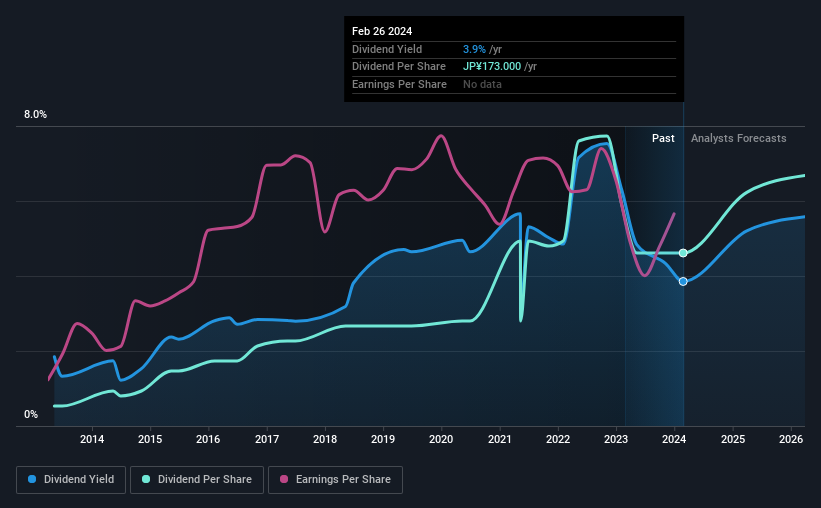- Japan
- /
- Construction
- /
- TSE:1820
Nishimatsu Construction (TSE:1820) Is Paying Out A Larger Dividend Than Last Year

Nishimatsu Construction Co., Ltd.'s (TSE:1820) dividend will be increasing from last year's payment of the same period to ¥93.00 on 1st of July. This will take the annual payment to 3.9% of the stock price, which is above what most companies in the industry pay.
View our latest analysis for Nishimatsu Construction
Nishimatsu Construction's Dividend Is Well Covered By Earnings
If the payments aren't sustainable, a high yield for a few years won't matter that much. Before making this announcement, Nishimatsu Construction was earning enough to cover the dividend, but it wasn't generating any free cash flows. No cash flows could definitely make returning cash to shareholders difficult, or at least mean the balance sheet will come under pressure.
Over the next year, EPS is forecast to expand by 10.5%. If the dividend continues on this path, the payout ratio could be 65% by next year, which we think can be pretty sustainable going forward.

Dividend Volatility
The company has a long dividend track record, but it doesn't look great with cuts in the past. The annual payment during the last 10 years was ¥20.00 in 2014, and the most recent fiscal year payment was ¥173.00. This implies that the company grew its distributions at a yearly rate of about 24% over that duration. Dividends have grown rapidly over this time, but with cuts in the past we are not certain that this stock will be a reliable source of income in the future.
The Dividend's Growth Prospects Are Limited
Given that the dividend has been cut in the past, we need to check if earnings are growing and if that might lead to stronger dividends in the future. It's not great to see that Nishimatsu Construction's earnings per share has fallen at approximately 2.1% per year over the past five years. If earnings continue declining, the company may have to make the difficult choice of reducing the dividend or even stopping it completely - the opposite of dividend growth. It's not all bad news though, as the earnings are predicted to rise over the next 12 months - we would just be a bit cautious until this can turn into a longer term trend.
Nishimatsu Construction's Dividend Doesn't Look Sustainable
Overall, this is probably not a great income stock, even though the dividend is being raised at the moment. While the low payout ratio is a redeeming feature, this is offset by the minimal cash to cover the payments. We would be a touch cautious of relying on this stock primarily for the dividend income.
Investors generally tend to favour companies with a consistent, stable dividend policy as opposed to those operating an irregular one. At the same time, there are other factors our readers should be conscious of before pouring capital into a stock. For example, we've identified 2 warning signs for Nishimatsu Construction (1 shouldn't be ignored!) that you should be aware of before investing. If you are a dividend investor, you might also want to look at our curated list of high yield dividend stocks.
Valuation is complex, but we're here to simplify it.
Discover if Nishimatsu Construction might be undervalued or overvalued with our detailed analysis, featuring fair value estimates, potential risks, dividends, insider trades, and its financial condition.
Access Free AnalysisHave feedback on this article? Concerned about the content? Get in touch with us directly. Alternatively, email editorial-team (at) simplywallst.com.
This article by Simply Wall St is general in nature. We provide commentary based on historical data and analyst forecasts only using an unbiased methodology and our articles are not intended to be financial advice. It does not constitute a recommendation to buy or sell any stock, and does not take account of your objectives, or your financial situation. We aim to bring you long-term focused analysis driven by fundamental data. Note that our analysis may not factor in the latest price-sensitive company announcements or qualitative material. Simply Wall St has no position in any stocks mentioned.
About TSE:1820
Nishimatsu Construction
Engages in the construction, development, real estate, and other businesses in Japan and internationally.
Average dividend payer and fair value.
Market Insights
Community Narratives



